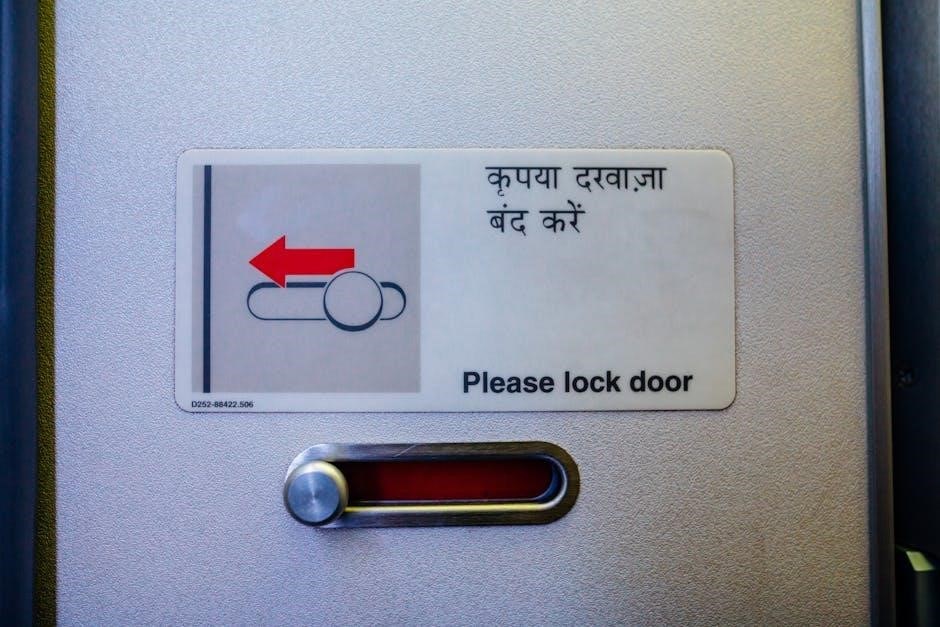Overview of the Kansas Instructional Permit
The Kansas Instructional Permit allows individuals aged 14 and older to practice driving under supervision. It is a crucial step toward obtaining a restricted or full driver’s license, requiring parental consent for applicants under 16. The permit ensures new drivers gain essential experience in a controlled environment before advancing to independent driving privileges.
Definition and Purpose
The Kansas Instructional Permit is a temporary license allowing individuals aged 14 and older to practice driving under supervision. Its primary purpose is to provide a structured environment for new drivers to gain experience before advancing to a restricted or full driver’s license. The permit is essential for developing safe driving skills and understanding traffic laws, ensuring applicants are prepared for independent driving responsibilities.
Legal Requirements and Benefits
The Kansas Instructional Permit requires applicants to meet specific legal standards, including age verification and parental consent for those under 16. Vision testing is mandatory for all applicants. The permit offers benefits such as allowing supervised driving practice, which is essential for skill development. It also serves as a stepping stone toward obtaining a restricted or unrestricted license, providing a structured path for new drivers to progress safely and legally.

Eligibility Requirements
The Kansas Instructional Permit is available to individuals aged 14 and older, requiring parental consent for those under 16. Vision testing is mandatory, ensuring readiness to drive safely under supervision.
Age Requirements
The Kansas Instructional Permit is issued to individuals aged 14 and older. Applicants under 16 must obtain parental consent, while those aged 17 and above have fewer restrictions. For drivers under 16, the permit is essential for supervised practice before progressing to a restricted license. Applicants aged 16 to 17 must hold the permit for at least six months prior to applying for a restricted license. Those 17 and older may apply without parental consent but must still pass a vision test.
Documentation and Parental Consent
Applicants for a Kansas Instructional Permit must provide acceptable proof of identity, such as a birth certificate or Social Security card. Parental or guardian consent is mandatory for applicants under 16 years old. Additional documentation, such as proof of residency, may also be required. This ensures compliance with state regulations and confirms the applicant’s eligibility to obtain the permit. Parental consent is not required for applicants aged 17 and older.
Application Process
The Kansas Instructional Permit application requires visiting a DMV office, submitting required documents, paying fees, and completing necessary testing to obtain the permit successfully.
Required Documents
To apply for a Kansas Instructional Permit, you must present acceptable proof of identity, such as a birth certificate or valid passport. Additional documentation may include Social Security verification and proof of residency. Applicants under 16 require parental or guardian consent, which must be notarized or provided in person. Ensuring all documents are accurate and up-to-date is essential for a smooth application process.
Submission and Fees
The application process for a Kansas Instructional Permit requires submitting the completed form and fees at a Kansas DMV office. The fee is typically around $10 to $20, depending on the applicant’s age and permit type. Payment can be made using cash, check, or credit card. Once approved, the permit is issued immediately and is valid for one year. Additional fees may apply for corrections or replacement of the permit; Ensure all documents and payments are in order for a seamless submission process.
Testing Requirements
A vision test and a written knowledge test are mandatory for obtaining a Kansas Instructional Permit. These assessments ensure applicants meet visual and cognitive standards for safe driving.
Vision Test Details
A vision test is required to ensure applicants meet Kansas’ visual acuity standards. The test assesses both eyes together and individually, focusing on clarity and peripheral vision. Applicants must demonstrate the ability to see clearly and safely operate a vehicle. If corrective lenses are needed, they must be worn while driving. Failure to meet the vision standards may require a medical evaluation or restrictive licensing based on visual capabilities.
Written Knowledge Test
The written knowledge test assesses understanding of Kansas traffic laws, road signs, and safe driving practices. It is required for all applicants seeking an instructional permit. The test ensures applicants have the necessary knowledge to operate a vehicle safely. Studying the Kansas Driver’s Manual is highly recommended to prepare for the exam. Passing the test is a critical step toward obtaining the permit and progressing toward a restricted or full driver’s license.

Driving Restrictions
The Kansas Instructional Permit requires a licensed adult over 21 in the front seat at all times. Drivers under 16 cannot carry more than one passenger under 18 unless they are siblings.
Supervision Rules
While driving with a Kansas Instructional Permit, a licensed adult aged 21 or older must always accompany and supervise the driver. This adult must sit in the front passenger seat to provide guidance and ensure safe driving practices. The supervising driver must have a valid license and be capable of taking control of the vehicle if necessary. This rule applies to all permit holders, regardless of age, to ensure a safe learning environment on the road.
Time and Location Restrictions
Holders of a Kansas Instructional Permit can only drive during daylight hours unless accompanied by a licensed adult aged 21 or older. Driving is restricted to locations necessary for the permit holder to gain experience, such as practicing in low-traffic areas. The supervising driver must always be in the front passenger seat, ready to assist if needed. These restrictions aim to minimize risks and ensure a safe learning environment for new drivers.

Progression to a Restricted License
To advance, applicants must be at least 16 years old and hold their instructional permit for one year. They must complete 25 hours of supervised driving, including 10 at night, to qualify for the restricted license, demonstrating readiness for more independent driving privileges.
Criteria for Advancement
To progress to a restricted license, applicants must meet specific requirements. They must be at least 16 years old and have held their instructional permit for one year. Additionally, they must complete 25 hours of supervised driving, including 10 hours at night, to demonstrate their readiness for more independent driving privileges. These criteria ensure that drivers gain sufficient experience and skills before advancing to the next stage of licensing.
Application Process for Restricted License
To apply for a restricted license in Kansas, applicants must be at least 16 years old and have held their instructional permit for one year. They must also complete 25 hours of supervised driving, including 10 hours at night. Additionally, applicants need to provide proof of identity and residency. A parent or guardian must certify the completion of the required driving hours. Once these requirements are met, the applicant can submit their application and fees to the Kansas Department of Revenue to obtain their restricted license.

Role of Parental Involvement
Parents or guardians must provide consent for applicants under 16 to obtain an instructional permit. They are also responsible for supervising driving practice and certifying completed hours.
Legal Responsibilities
Parents or guardians of minors under 16 must provide written consent for the instructional permit. They are legally responsible for ensuring the young driver complies with permit rules, including supervision requirements. Parents must certify the completion of required driving hours and may be held liable for violations committed by the minor. This legal oversight ensures compliance with state driving regulations and safety standards, fostering responsible driving habits from an early age.
Supervision Requirements
Holders of a Kansas Instructional Permit must always be accompanied by a licensed adult aged 21 or older in the front passenger seat. This ensures safe driving practices while gaining experience. The supervising driver must hold a valid license and be capable of taking control of the vehicle if necessary. This requirement is strictly enforced to ensure compliance with state driving regulations and to promote safe learning conditions for new drivers.
Best Practices for Using the Permit
Log driving hours diligently, adhere to supervision rules, and maintain a clean driving record to ensure safe progression toward a restricted license and full driving privileges.
Logging Driving Hours
Accurately logging driving hours is essential for advancing from an instructional permit to a restricted license in Kansas. Applicants must complete 25 hours of supervised driving practice, including nighttime hours, to meet state requirements. Keeping a detailed and accurate log ensures compliance with regulations and helps track progress. Parents or guardians should verify and sign off on the hours to confirm completion. This step is crucial for demonstrating readiness for independent driving privileges, as it reflects both experience and responsibility behind the wheel.
Maintaining a Clean Driving Record
Maintaining a clean driving record is crucial while holding a Kansas Instructional Permit. Avoiding traffic violations and accidents ensures eligibility for advancing to a restricted license. Any citations or incidents may delay the process or require additional penalties. A clean record demonstrates responsibility and readiness for independent driving privileges. It is essential to follow all traffic laws, practice safe driving habits, and avoid risky behaviors to maintain a spotless record throughout the permit period.
